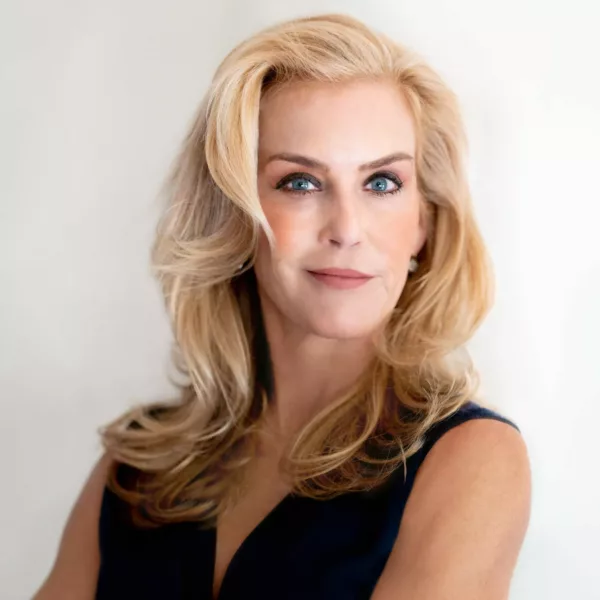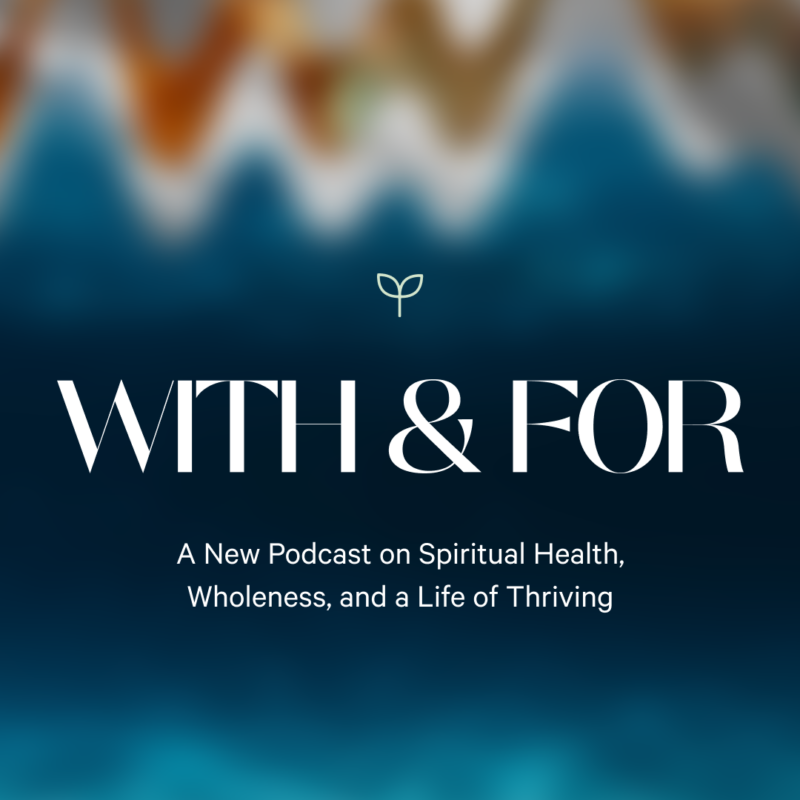Pam King: Welcome to With & For, a podcast about spiritual health and thriving on purpose.
Hello, my friends. I’m your host, Dr. Pam King.
I’ve spent the last 20 years as a professor, a pastor, and a parent. I draw on all of these in understanding thriving. I think at the core of my being is really wanting to enable people to thrive. Of course, my children, my students, my friends, family, my colleagues. But in my work vocationally, I started asking, what does it mean to thrive? Do all people thrive the same way? Do we thrive differently? And the last 20 plus years have been a journey of curiosity, of wonder, exploration, a lot of testing, empirical research, to really wrap my mind around this idea and notion of thriving.
My research has involved the opportunity to interview people from all sorts of cultures all over the globe. It’s been remarkable to observe that people can thrive with a sense of fullness of life, a sense of being very at home with who they are, and a sense of meaning and purpose, in so many different circumstances that do not always include privilege and often are in the context of poverty.
I’ve seen kids be able to make sense of the suffering and loss around them, their ability to draw on their faith as a source of hope, as a source of motivation and power, to give back, to grow, to find meaning and be contributors and give to the people around them, and most importantly, to experience joy.
As a production of the Thrive Center, With & For, as a podcast, is all about spiritual health. Spiritual health is a perspective that acknowledges that spirituality is super powerful, multifaceted, and quite complex. But not all spirituality is good. In fact, some forms of spirituality are obviously very harmful and detrimental, both for individuals or from a social level.
But our approach to spiritual health is informed by years of psychological research that provides empirical insight into how aspects of spirituality can be helpful for thriving. But what is thriving? Thriving is growing wholly alive with and for others and a higher purpose. Thriving involves growth, but the reality is we don’t always grow in a linear way.
It’s being adaptive and addressing different challenges and opportunities that come around us, and we all do that differently. We all thrive very uniquely. And so by pursuing spiritual health, we become equipped with the skills that we need for resilience in hard times, and also for pursuing purpose and meaning and connection throughout it all, given that we all thrive differently.
One of the questions that I ask each of my guests is, what is thriving to you? Know that I purposely invited guests that I knew would have really helpful, rich perspectives on thriving. And the only way to know how you thrive is to try out different practices and different perspectives to see what strengthens who you are in a way that you are able to live more intimately, more generatively, and more purposely with others. So on the podcast, I’ve brought together a bunch of experts that speak from really different perspectives, whether it’s different scientific expertise, and in some cases, even some different philosophical or spiritual backgrounds.
But each one of them give us practices, tools, and perspectives that we can incorporate into our own lives that will enable us To live more fully, to find out more wholly who we are to bring more focus to our day. Clarity about our values, our sense of purpose, and what matters. I’ve been so grateful to explore different people’s perspectives of thriving.
I know you’re going to benefit from both their scientific expertise and also their lived experience.
Here’s a few short clips to give you a sense of how my guests this season answered one of my favorite questions: what is thriving to you?
Alexis Abernethy: Thriving means walking toward discovering and experiencing the calling that God has for my life. It doesn’t mean I’m always in it. It’s walking toward it. The discovery is really rich. You know, you think of calling as a destination. It’s not. It evolves.
Miroslav Volf: Love of God, love of neighbor. Seek the kingdom, the good of the world, and in that good of the whole, your own good, and be attuned to what is around you in joy and also in sorrow.
Belle Liang: Thriving is living in your joy. It’s making the impact that you care about making in a way that’s really aligned with your deepest core beliefs and values.
Dwight Radcliff: Thriving is not a one size fits all answer or solution from my embodied incarnated experience as an African American man in America. I think it really has to do with this ability to, to dream and to live.
Sue Johnson: Thriving for me means full existential living, fully engaged in your experience. You basically trust yourself. to go through life in an active way and you can create a coherent reality for yourself that includes others, that includes a safe relationship with others.
Sarah Schnitker: Thriving, to me, it’s loving God and loving others and living in a society where we have love and justice.
Jim Furrow: The word that comes to my mind is a fulsome sense of being and that being is not only who I am, but who I am with and a part of, and that life is full of engagement and vitality.
Pam King: And what is thriving to you?
Lisa Miller: Living in alignment with God’s will.
Dan Siegel: The mind wants certainty so it can guarantee survival. But in a way, the irony is, thriving happens when you let go of this flimsy fantasy of certainty and you allow yourself to wander as a verb through the journey of life.
Alexia Salvatierra: The word bienestar means well being, but it’s not just individual. Bienestar is the translation for shalom. So it always has a communal dimension because our cultures are much more communal. So there’s really this sense that if your family’s not well. You’re not well, if your community is not well, you’re not well.
Bill Damon: Thriving to me is becoming the person that you’ve always dreamed that you want to become. As long as you’re alive, you’re continuing to make progress. And there’s always that possibility of getting further along the road.
Cynthia Eriksson: For me, thriving is to be able to be fully myself; to really know that I am loved by God.
Richie Davidson: I would say thriving is nurturing all of the innate capacities that we’ve been given. And I would say perhaps the most important manifestation of that is our capacity to both receive and to express love.
Pam King: I’m so excited about this podcast because I have brought together. A group of experts that speak out of research and years of scholarship that have practical insights for how people can thrive. So that people can become more fully themselves, which often in the U. S. is a very individualistic endeavor.
But the reality is, as humans, we become much more alive when we’re with others and when we’re for others. not just ourselves. And part of that involves living with a sense of purpose. Understanding what truly matters, who truly matters, what we want to be about, and integrating that into an achievable or pursuable goal.
We’re in a world of hurt and pain and loss and suffering. And so many of our models of health or thriving are recovering from illness, managing symptoms, or getting over suffering, but I believe life offers so much more; that there’s an invitation to not just become whole, but to become wholly alive. And that’s a process that’s more than just treating symptoms, but that is a process of becoming ourselves, of growing into our strengths, addressing our needs along the way, living into deepening intimacy and engagement with others, and also cultivating a sense of meaning and spirituality and faith that fuels us and compels us into a whole life with and for others. And I’m really excited because psychological science is providing great insights into how spirituality can be really effective and helpful for people.
It’s really important to me to approach the science from somewhat of a pluralistic perspective to understand how these findings are meaningful to people from various religious traditions, or who maybe are not religious at all. From my own experience as a Christian, an ordained Presbyterian minister, I have found the psychology extremely illuminating to understand how my faith can be activated in a way that not only spurs on individual well being, but also enables people to thrive in a way that they contribute to a flourishing world.
In our current day and age, the vast psychological resources available through spirituality and religion are not well understood. Faith leaders and community leaders have a lot to gain from understanding how they can activate psychological resources. So this podcast has come together in a way where I bring together experts from various psychological perspectives and even theological perspectives that give insight into how people can access spirituality, faith, or religion in a way that promotes thriving – that promotes a type of well being that is bigger than oneself, that enables one to become wholly alive with and for others, and that I believe will ultimately contribute to flourishing societies.
My earliest questions about thriving stemmed from something very personal to me, and that is my faith. As a Christian, I grew up experiencing a sense of a loving God, a God who cares deeply about us, a God who I believe created us. And as I grew and started to pursue graduate work, I had this conviction that God wants us to be fully alive, to be fully the people he created us to be.
But I didn’t find that working out or expressed often in the religious circles I was in. I often experienced more preoccupation with behaviors, and rules and attendance, and not so much an invitation to become wholly oneself. So underlying this idea of thriving is this notion of becoming fully who we are meant to be for a greater purpose, not just for ourselves.
And psychologically, the research bears out that when you’re focused on yourself, that is a short dead end street. But when we do live in a way that is deeply connected with others, that is deeply generative in giving towards others, and when we have a sense of purpose in our lives, we thrive. We do better in school, we’re more effective at our jobs, we report more joy and happiness, we even have better physical outcomes. So this sense of thriving is something that is everything from physical, psychological, social, and spiritual. And in this podcast, we investigate how spirituality is part of that. Our approach to spirituality or spiritual health is probably not what you’re used to.
Psychology provides a ton of insight into the multi dimensionality or the many facets of spirituality. So when we think about spiritual health, we’re not just thinking about transcendence or something bigger beyond the material world, but we’re also thinking about our sense of self and our identity.
We’re thinking about our vocation and purpose, our relationships in our community, our ethics and the virtues that we embody in our lives. And also we’re really intentional about the practices and the rhythms that enable us to thrive. Spirituality and psychology are such a dynamic duo. They both give great insight into what it means to be and become human.
After a good couple decades of research on the psychology of spirituality and religion, we’re at a really exciting time where we’re gaining a lot of empirical insight into what types of spiritual practices are actually transformative – that bring change to people. What I love about the findings that are evolving in the research is that we’re learning so much about not just body based practices, which help us calm our minds and our emotions that open us up to new experiences, that allow us to focus, to gain clarity, but we’re also understanding a science of relational practices and understanding why human connection is so important. Yes, there’s lots of press about loneliness and disconnection, But in this podcast, you’re going to hear a lot about the benefits of relationships and what occurs when we are connected to people, when we have those that we feel safe with, that we feel seen by and cared for, that enables our brains to function more effectively, to be more open to the world.
So when we experience love. When we know that we are loved and truly matter, we are able to live that love out as ourselves. In other words, we’re able to offer more love. And so it’s imperative that we pursue relationships where we are known and truly loved.
And in my own pursuit, particularly when I was studying theology as a graduate student, I was captivated by the ideals set forth in scripture. But I was so dissatisfied with practical implications for how people grow and change. So then I went back to a psychology to study human development, to understand psychological perspectives on how people grow. How they gain a sense of identity, how relationships matter, how people can become more effective in relationships, how they can find meaning and purpose, the role of moral development, character and virtue, that these all play an important part in becoming human. One of the values of the show is providing practical tools and practical guidance.
This is where psychology is so helpful. The conversations that you’ll hear will provide really specific insights into how to connect with a deeper sense of self, and how also to get clear about ideals that actually guide and direct you. Psychological science really helps us understand how important our bodies are for our well being and how much important information we can gain through them.
This show is for people who are interested in growing and focused on people centered leaders. We designed the show in such a way that you will have a lot of practical take homes, things you can do on your own, introducing various body based practices that can be understood as spiritual exercises that will allow you to be more in tune with who you are, your deepest desires and values and sense of purpose, that will also enable you to take other people’s perspective and cultivate a deeper sense of empathy.
I’m so excited to offer you these different practices and perspectives that you can try out and see what action steps you can take to build a life of thriving.
We all long to live lives of purpose and meaning, but it’s So easy to get drawn off course or distracted on our own individual or our collective journeys to spiritual health and thriving. So this is an invitation to join me and the Thrive Center in a new podcast community that is going to explore the multifaceted nature of spiritual health and guide you along a path to your own thriving life.
With & For is a production of the Thrive Center at Fuller Theological Seminary. This season, new episodes drop every Monday. And don’t miss our weekly Friday series of podcast shorts, Playing with Light, where I get to share some of my curiosity and wonder and offer a practical insight to help you stay on your path to spiritual health.
For more information, visit our website, thethrivecenter.org, where you’ll find all sorts of resources to support your pursuit of wholeness and a life of thriving on purpose.
I am so grateful to the staff and fellows of The Thrive Center and our With & For podcast team. Jill Westbrook is our Senior Director and Producer. Lauren Kim is our Operations Manager. Wren Juergensen is our Social Media Graphic Designer. Evan Rosa is our Consulting Producer.
And special thanks to the team at Fuller Studio and the Fuller School of Psychology in Marriage and Family Therapy.
I’m your host, Dr. Pam King. Thank you for listening.
 Pamela Ebstyne King
Pamela Ebstyne King
Dr. Pam King is Executive Director the Thrive Center and is Peter L. Benson Professor of Applied Developmental Science at Fuller School of Psychology & Marriage and Family Therapy. Follow her @drpamking.
Episode Summary
What does it mean to thrive today? What can we do to pursue lives of wholeness and spiritual health? What can we learn from psychological science and spiritual wisdom to transform our relationships, our work, and our personal wellbeing? Dr. Pam King introduces With & For, a podcast for growth seekers and people focused leaders that plumbs the depths of psychological science and spiritual wisdom to offer practical guidance toward spiritual health, wholeness, and a life of thriving.
With & For is a new podcast exploring psychology, spirituality, and culture, with the aim of helping you grow wholly alive, with and for others, and a higher purpose. In this introductory episode, podcast host Dr. Pam King shares elements of her personal story and background, along with the goals of the podcast, and let’s this season’s guests share their personal take on what it means to thrive.
Show Notes
Help inspire the future of With & For! Click HERE to take our short survey! Four respondents will get a special box of goodies from the Thrive Center!
- Dr. Pam King introduces the show. Drawing on twenty years as a psychologist, pastor, and parent, her mission is to help people thrive.
- Our approach to spiritual health is informed by years of psychological research that provides empirical insight into how aspects of spirituality can be helpful for thriving.
- What is thriving?
- "Thriving is growing wholly alive with and for others and a higher purpose."
- "By pursuing spiritual health, we become equipped with the skills that we need for resilience in hard times, and also for pursuing purpose and meaning and connection throughout it all, given that we all thrive differently."
- Season 1 guests share their responses to one of Pam's favorite questions, "What is thriving to you?"
- Alexis Abernethy: Thriving means walking toward discovering and experiencing the calling that God has for my life. It doesn't mean I'm always in it. It's walking toward it. The discovery is really rich. You know, you think of calling as a destination. It's not. It evolves.
- Miroslav Volf: Love of God, love of neighbor. Seek the kingdom, the good of the world, and in that good of the whole, your own good, and be attuned to what is around you in joy and also in sorrow.
- Belle Liang: Thriving is living in your joy. It's making the impact that you care about making in a way that's really aligned with your deepest core beliefs and values.
- Dwight Radcliff: Thriving is not a one size fits all answer or solution from my embodied incarnated experience as an African American man in America. I think it really has to do with this ability to, to dream and to live.
- Sue Johnson: Thriving for me means full existential living, fully engaged in your experience. You basically trust yourself. to go through life in an active way and you can create a coherent reality for yourself that includes others, that includes a safe relationship with others.
- Sarah Schnitker: Thriving, to me, it's loving God and loving others and living in a society where we have love and justice.
- Jim Furrow: The word that comes to my mind is a fulsome sense of being and that that being is not only who I am, but who I am with and a part of and that life is full of engagement and vitality.
- Lisa Miller: Living in alignment with God's will.
- Dan Siegel: The mind wants certainty so it can guarantee survival. But in a way, the irony is, thriving happens when you let go of this flimsy fantasy of certainty and you allow yourself to wander as a verb through the journey of life.
- Alexia Salvatierra: The word bienestar means well being, but it's not just individual. Bienestar is the translation for shalom. So it always has a communal dimension because our cultures are much more communal. So there's really this sense that if your family's not well, you're not well. If your community is not well, you're not well.
- Bill Damon: Thriving to me is becoming the person that you've always dreamed that you want to become. As long as you're alive, you're continuing to make progress. And there's always that possibility of getting further along the road.
- Cynthia Eriksson: For me, thriving is to be able to be fully myself, to really know that I am loved by God.
- Richie Davidson: I would say thriving is nurturing all of the innate capacities that we've been given. And I would say perhaps the most important manifestation of that is our capacity to both receive and to express love.
- Living with and for others
- Suffering, pain, and loss
- Growing to become wholly alive
- Pam King's spiritual background as a Christian and a Presbyterian minister
- "God wants us to be fully alive, to be fully the people he created us to be."
- Thriving across all of life's domains: physical, psychological, social, spiritual, moral, vocational, educational, relational, and more
- Practical insight, tools, and guidance for real-life transformation
- "It's imperative that we pursue relationships where we are known and truly loved."
- "This is an invitation to join me and the Thrive Center in a new podcast community that is going to explore the multifaceted nature of spiritual health and guide you along a path to your own thriving life."
About Dr. Pam King
Dr. Pam King is Executive Director the Thrive Center and is Peter L. Benson Professor of Applied Developmental Science at Fuller School of Psychology & Marriage and Family Therapy. Follow her @drpamking.About With & For
- Host: Pam King
- Senior Director and Producer: Jill Westbrook
- Operations Manager: Lauren Kim
- Social Media Graphic Designer: Wren Juergensen
- Consulting Producer: Evan Rosa
About the Thrive Center
- Learn more at thethrivecenter.org.
- Follow us on Instagram @thrivecenter
- Follow us on X @thrivecenter
- Follow us on LinkedIn @thethrivecenter
Explore More

Christian
What is Thriving and Why is it Important?
Psychology and theology come together to provide a vision for the good life

Agility
Top Apps for Thriving
When used properly, technology can help us thrive. Our research team shares the 9 apps that can boost relationships, beliefs, and purpose.

Thriving
An Invitation to Thrive
Dr. Pamela King invites leaders to reimagine and lead in new ways in order to enable all people and communities to thrive.
